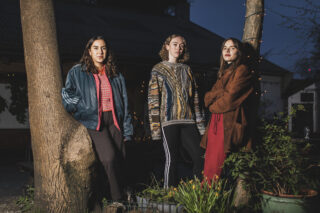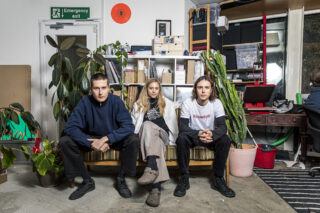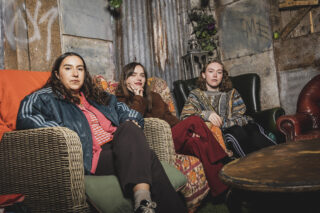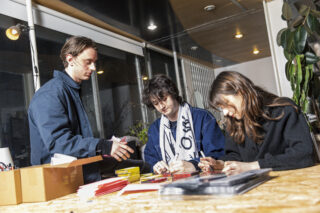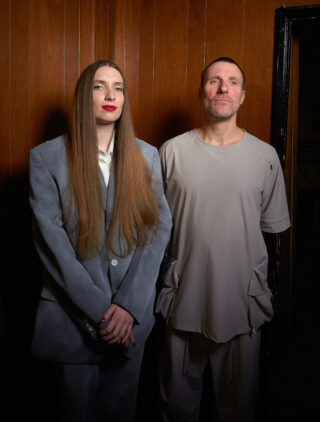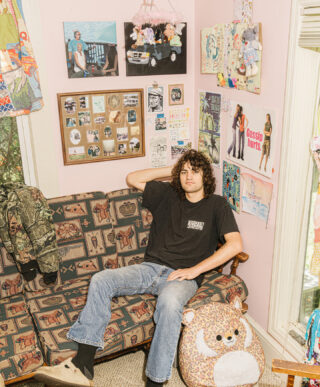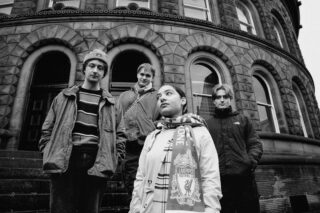A notable exception to this is The Windmill, the Brixton pub which is largely credited as the birthplace of the scene, and which survived the pandemic thanks to a huge amount of fundraising, including gigs, a Crowdfunder campaign and an auction with items from the likes of Liam Gallagher and Sleaford Mods. Its mythical status was cemented when new 25,000-capacity festival Wide Awake festival named their main stage The Windmill stage, and roped in booker Tim Perry to help curate the line up, a bill which included Shame, PVA, Idles and Black Country, New Road, all of whom he gave slots to early in their career.
“The thing that makes The Windmill such a special venue, and Tim such a genius curator, is the space they give to artists,” Alex Putman, founder of the Untitled (Recs) label, tells me. “He gave Jerskin (Fendrix, who is signed to Untitled) five nights to do what he wanted, and the same for Black Midi with their Sonic BM stuff.” Untitled (Recs) recently hosted their own residency at The Windmill, in honour of their fifth anniversary. Featuring many of their artists (Deathcrash, Rosie Alena, Famous, Elsas) and friends like Glows, Lou Terry and Tyler Cryde, the nights felt like a celebration of the community that the label has fostered, in part through coming to shows in that same room. The Untitled (Recs) roster came about organically, with Putman (alongside co-conspirators Camilla Simmons and Vincent Hasselbach) finding new acts through “a web of chats and recommendations,” although he’s hesitant to describe their approach as DIY. “I don’t know if that fits,” he says diplomatically. “We definitely ‘do it ourselves’, this is true, but I don’t think any of our artists have that aesthetic.” Indeed, the Untitled (Recs) sound is markedly different to the neo post-punk which is often associated with The Windmill. Their artists sit across a spectrum of genres, united by high production values and a shared creative sensibility rather than a specific style. Slow Dance, with whom Untitled (Recs) share an office space in London Fields, echo this sentiment. “We work with genre clashes that make no sense but at the same time make total sense. We wanted early on to echo the eclecticism that our generation exists in,” says Marco Pini, who alongside Darius Williams started Slow Dance as a zine while he was still at school, before it eventually became a night, a label and a management company.
Although they’ve always been based in north and east London, “it’s definitely connected to the mythology around the South London scene,” admits Maddy O’Keefe, who now co-runs Slow Dance with Pini and Williams. “We’re the same age as Sorry, Shame, HMLTD and Goat Girl, and started up when these bands were gaining traction. Everyone was hanging out at the same venues and working together – promoters like Black Cat White Cat (run by Sorry’s Campbell Baum), photographers like Holly Whitaker, artists, filmmakers and designers would just gravitate to South London as a creative nucleus.”
Like Untitled (Recs), Slow Dance’s network of musicians and collaborators came about unintentionally. “It often is artists we meet from conversations in smoking areas of venues, friends of friends,” notes Pini. “Most of our artists are signed stemming from interesting conversations and friendship first.” They often refer to themselves as a collective, citing a “desire to bring people together” as a big motivation behind their output. As well as a growing roster of both label and management clients (which includes PVA, Platonica Erotica, Saint Jude and Sarah Meth), Slow Dance release an annual compilation with original tracks from a range of friends; previous iterations have included Lynks, Folly Group, and solo outings from members of Black Midi and Squid.
“We’ll always try to think outside of the box, or do something that will enhance the music or whatever the artist is trying to do,” says O’Keefe. “We’ve also on-and-off had our own space [Slow Space] in our studio complex, where we’ve had some really lovely intimate shows, exhibitions and screenings.”
The pair speak highly of The Windmill. “I do think there’s nowhere like it really,” says O’Keefe. “I feel very sentimental towards it and think I always will.” Pini emphasises the importance of recognising the people behind the venues, “like Tim from The Windmill and Annie from Bunker Club in Deptford (who sadly passed away recently). They were really what allowed us to do what we do now. They had such care and enthusiasm for our enthusiasm – it made us feel like there is some hope out there in a city which is usually led by money over creating community.”




